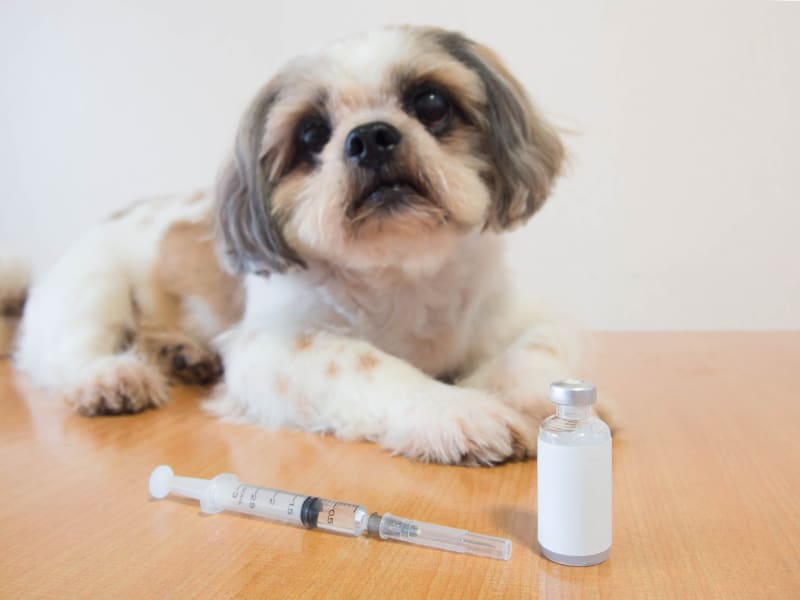Is DHPP Vaccine Necessary For Dogs? The Fact and Side Effect

Regarding the health and well-being of our pets, prevention is always better than cure.
This adage holds particularly true in canine healthcare, where vaccinations play a pivotal role.
Among the essential vaccines for dogs is the DHPP vaccine, a critical component in safeguarding them against some severe diseases.
This vaccine not only protects individual dogs but also plays a crucial role in the broader context of public and canine health.
In this comprehensive guide, we’ll delve into the details is DHPP vaccine necessary for dogs, its importance, the diseases it prevents, and why it’s a non-negotiable aspect of your dog’s healthcare regimen.
Key Takeaways:
- The DHPP vaccine for dogs helps prevent harmful diseases like distemper, hepatitis, kennel cough, and parvovirus. These diseases can be bad for dogs, and the vaccine keeps them safe.
- The DHPP vaccine is a super important core vaccine for dogs, especially puppies. It stops them from getting severe illnesses or even dying from diseases like distemper virus or liver problems. Getting the vaccine is the best way to make sure dogs stay healthy.
- Puppies get the DHPP vaccine a few times when they are little, and then they get booster shots as they grow up. Adult dogs still need booster shots every few years to stay protected. Vets might change their schedule based on how healthy a dog is and where they live.
- Some pet parents think dog vaccines can make dogs sick, but that’s not true. The DHPP vaccine is safe and helps dogs more than it can hurt them. Also, getting the vaccine isn’t just about one dog – it helps keep all other dogs healthy and even protects pet owners too. So, it’s a good thing for everyone!
What is DHPP?
The Components of DHPP
The DHPP vaccine protects against more than one disease as it is a combination vaccine. The DHPP vaccine for dogs stands for Distemper, Hepatitis, Parainfluenza, and Parvovirus. It’s often referred to as the CD vaccine or the puppy vaccine.
- Distemper: According to the American Veterinary Medical Association it is a viral disease affecting dogs’ respiratory, gastrointestinal, and nervous systems. Canine distemper virus is often fatal, and even if a dog survives, it may have permanent, debilitating damage to its nervous system.
- Hepatitis: Specifically, this refers to canine adenovirus type 1, leading to liver disease. It’s a highly contagious serious disease that can be fatal, especially in young puppies.
- Parainfluenza: This is a canine parainfluenza virus and one of the contributors to the canine infectious tracheobronchitis, also known as kennel cough.
- Canine Parvovirus: According to the Merck Veterinary Manual, It is a highly contagious virus. This virus causes severe gastrointestinal tract illness in dogs causing bloody diarrhea, particularly in puppies, and is often fatal due to the intense dehydration and secondary infections it causes.
Each of these diseases can be devastating, but they are preventable through vaccination. The DHPP vaccine is typically administered in a series of shots to puppies, with booster shots given at various stages of a dog’s life.
The Role of Each Component
- Distemper Prevention: The distemper part of the vaccine helps in building immunity against the canine distemper virus. It’s essential for puppies as they are most susceptible to this disease.
- Infectious Canine Hepatitis: The hepatitis component of DHPP safeguards dogs from the canine adenovirus, which primarily affects the liver. Since there’s no cure for this virus, prevention through vaccination is critical.
- Combatting Parainfluenza: The canine parainfluenza portion of the DHPP vaccines plays a crucial role in protecting dogs from one of the common agents of Parainfluenza. While it is not typically life-threatening, it can lead to more severe complications, especially in newborn puppies and weak older dog’s immune system.
- Protecting Against Parvovirus: The parvovirus component is perhaps one of the most critical aspects of the DHPP vaccines. Canine parvovirus is a highly contagious disease spread from direct contact and is known for its severity, particularly in unvaccinated dogs. It attacks rapidly dividing cells, like those in the intestines and bone marrow, leading to severe digestive system distress and a compromised dog’s immune system.
Why is the DHPP Vaccine Necessary?
It is a combination vaccine/multiple vaccines, each component of the core vaccine for dogs plays a vital role in preventing diseases that can be debilitating or even fatal to dogs and strengthening the immune system. Let’s explore the necessity of this vaccine in more detail.
Distemper: A Deadly Threat
Canine distemper virus, once a leading cause of death in dogs, has been significantly controlled through widespread vaccination. However, it still poses a threat, especially in areas where vaccine coverage is low.
The virus spreads through airborne exposure and can lead to severe symptoms like fever, nasal discharge, coughing, lethargy, loss of appetite, and more seriously, seizures and paralysis.
Hepatitis: Protecting the Liver
Canine hepatitis, caused by the adenovirus, directly affects a dog’s liver. It spreads through the bodily fluids of infected dogs and can lead to severe liver damage, eye damage, and breathing problems. Vaccination is the only effective way to prevent this disease.
Parainfluenza: More than Just a Cough
While often less severe than the other diseases covered by the DHPP vaccines, canine parainfluenza can contribute to kennel cough, which can be particularly problematic in shelters and kennels.
It spreads rapidly in these environments, and prevention through vaccination is key to controlling outbreaks.
Parvovirus: A Lethal Foe
Parvovirus is especially notorious for its impact on puppies. It causes severe vomiting, and diarrhea, and can lead to life-threatening dehydration.
Due to its highly contagious nature and the severity of its symptoms, vaccination against parvovirus is considered essential for all other dogs.
Vaccination Schedule and Protocols
The DHPP vaccine is typically administered in a series, starting when a puppy is around 6 to 8 weeks old.
Puppy Vaccination Schedule
- Initial puppy shots of DHPP vaccinations are given at 6 to 8 weeks of age.
- Boosters are then administered at 3- to 4-week intervals until the puppy is 16 weeks old.
- This is followed by a booster shot at one year of age.
Adult Dogs Vaccination
- After the one-year booster, dogs typically receive a DHPP booster every three years.
- However, your veterinarian may recommend a different schedule based on your dog’s health, lifestyle, and risk factors.
Continued monitoring and regular check-ups with a veterinarian immediately are crucial to maintaining your dog’s health and keeping their vaccinations up to date.

Risks and Misconceptions
Addressing Common Misconceptions
There are several misconceptions surrounding the DHPP vaccine and dog vaccinations in general.
One common myth is that vaccines can cause the diseases they’re meant to prevent. This is not true; the DHPP vaccine is made from killed or modified viruses that cannot cause disease.
Another misconception is that natural immunity is better than vaccine-induced immunity. While natural immunity can be effective, the risks associated with contracting these diseases far outweigh the benefits.
Understanding the Risks
Like any medical intervention, vaccines can have side effects, but serious side effects are rare. The most common reactions are mild and short-lived, such as soreness at the injection site, mild fever, or lethargy. Severe reactions, like allergic reactions, are very rare.
The benefits of vaccination in preventing serious, often fatal diseases, vastly outweigh these risks.
The Broader Benefits of Vaccination
Herd Immunity in Dogs
Vaccination isn’t just about protecting individual dogs; it’s also about protecting the wider canine community (Core Vaccine). When a high percentage of the population is vaccinated, it creates herd immunity, reducing the chance of disease outbreaks.
This is particularly important for protecting dogs that cannot be vaccinated due to health reasons.
Public Health and Safety
Some diseases that the DHPP vaccine protects against can have implications for dog owners as well. For example, canine hepatitis can be transmitted to humans. By vaccinating dogs, we’re also taking a step towards protecting public health.
Conclusion
The DHPP vaccine is an essential part of your dog’s healthcare regimen as it is a core vaccine. It protects against some of the dogs’ most severe and potentially fatal diseases.
Regular vaccinations, as recommended by your vet, not only keep your dog healthy but also contribute to the broader health of the canine and human communities.
Frequently Asked Questions:
Is the DHPP vaccine mandatory?
While not legally mandatory in most places, it is highly recommended by veterinarians for many dogs and is an essential vaccine in many places. DHPP vaccine cost is very low compared to the treatment of these diseases.
Can my dog get sick from the DHPP vaccine?
While mild side effects like allergic reactions are possible, the chances of your dog getting sick from the vaccine are extremely low.
How often does my dog need the DHPP vaccine?
After the initial doses and one-year booster vaccination, most dogs need a DHPP booster every three years, but your vet may recommend a different DHPP vaccine schedule.
Can older dogs receive the DHPP vaccine for the first time?
Yes, older dogs can and should be vaccinated if they have never received the DHPP vaccine.
